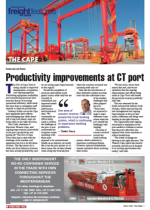Transnet National Ports Authority (TNPA) is working hard to improve performance at the three Eastern Cape ports as it steadfastly advances its recovery plans.According to Siya Mhlaluka, managing executive of the central region, while the road ahead may still be long, the most crucial aspect of this recovery drive lies in reassuring customers of the ports of Port Elizabeth, East London, and Ngqura that proactive measures are being taken."While we have lost business, and we recognise that we are not where we are supposed to be, the most critical aspect for us is to ensure our customers know that we will fulfil our promises," he emphasised during a recent business-to-business meeting. "It is crucial that we rebuild the confidence of the market, which is why we are actively engaging with our stakeholders. By opening communication channels and collaborating closely, we aim to work towards a shared goal of recovery and progress."He said much of the recovery plan being implemented in the central region was focused on enabling the efficient utilisation of port infrastructure and improving operational efficiencies at the ports. "One of our key focus areas is to instil a culture of high performance at these ports. We recognise that the performance of our people is integral to achieving our targets. Without their dedication and excellence, our goals remain out of reach."The Eastern Cape's overall economic performance has faced significant challenges when it comes to showing growth over the past decade. Most economic indicators signal a decline, including high unemployment rates and a reduction in both imports and exports. Investment into infrastructure has been inadequate, and the region's trade is under pressure. Mhlaluka said addressing these issues would require concerted efforts and strategic interventions to stimulate economic growth and revitalisation in the Eastern Cape. In this regard, the three ports had a major contribution to make as they remained the gateway of the Eastern Cape economy.“Our strategy is to ensure that the ports in the central region are competitive. We are investing in critical infrastructure and a reliable marine f leet. Our recovery plan is aligned to the overall Transnet group plan, which aims to improve operations and financial sustainability while ensuring operational efficiency improvements across the business over an 18-month timeframe between now and 2025.”He said each of the three ports had a strategic role to play. The Port of Ngqura was seen as an important transhipment and energy hub, while the Port of Port Elizabeth was well placed to be a hub for the automotive industry and East London’s port was niche to the agriculture sector.“These ports are not competing with each other; they complement each other with the overall aim they have of driving the economy in the Eastern Cape. Several investments are under way to strategically position the ports and diversify the range of cargo they can handle.”Mhlaluka said these initiatives were all aimed at enhancing the ports' capabilities, improving efficiency, and expanding their capacity to accommodate various types of cargo. Such investments are crucial for bolstering the competitiveness and resilience of the ports amidst evolving market demands and economic conditions.“At all three ports it is all hands on deck. We are working towards addressing challenges and delivering solutions that benefit stakeholders. Yes, we are in recovery mode, but we are committed to delivering on the promises we have made,” he said.Asked about the ongoing issue of bunkering services at the Eastern Cape ports, Mhlaluka said engagement with the South African Revenue Service (Sars) was continuing. This comes after bunkering services at the ports were suspended after Sars detained several vessels last year.“Bunkering has been the lifeblood of the central region ports and the events of last year were unfortunate. We have taken a hit and it has been regrettable. We continue to engage with Sars to contribute to the resolution of the situation.”

